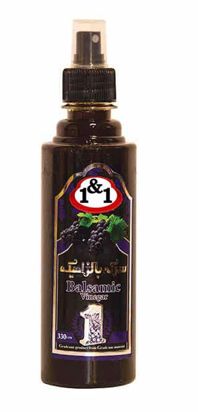Balsamic vinegar By 1&1
Balsamic Vinegar
Balsamic vinegar is a dark, flavorful, and slightly sweet vinegar that originates from Italy, particularly the Modena and Reggio Emilia regions. Made from reduced grape must (unfermented grape juice), it is aged in wooden barrels to develop its rich flavor and thick texture. Known for its versatility, balsamic vinegar is a staple in both traditional and modern cuisines.
Health Benefits of Balsamic Vinegar:
• Rich in Antioxidants:
• Contains polyphenols that help combat free radicals and promote cell health.
• Aids Digestion:
• Stimulates digestive enzymes and supports gut health.
• Helps Regulate Blood Sugar:
• Slows carbohydrate absorption and improves insulin sensitivity.
• Supports Heart Health:
• May reduce cholesterol levels and improve blood circulation.
• Low in Calories:
• A healthy alternative to calorie-dense condiments.
Types of Balsamic Vinegar:
1. Traditional Balsamic Vinegar (Aceto Balsamico Tradizionale):
• Aged for 12–25 years in wooden barrels, with a thick consistency and complex flavor.
2. Commercial Balsamic Vinegar:
• A blend of grape must and wine vinegar, aged for a shorter period, offering a lighter and more affordable option.
3. Balsamic Glaze:
• A thick, syrupy version often used for drizzling over dishes.
Uses:
• In Cooking:
• As a dressing for salads, a marinade for meats, or a glaze for roasted vegetables.
• In Desserts:
• Drizzled over fruits like strawberries or paired with vanilla ice cream.
• In Sauces:
• Adds depth of flavor to reductions and savory sauces.
Storage Instructions:
• Store in a cool, dark place.
• Ensure the bottle is tightly sealed to maintain freshness.

